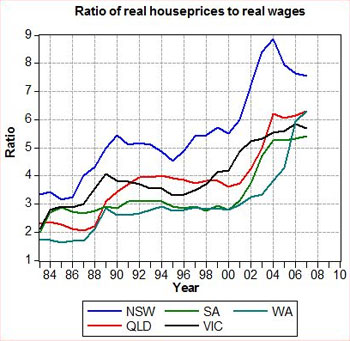Two tax changes announced in Tuesday’s Federal Budget actually work against business innovation. Businesses must now depreciate their computer software over 4 years, not 2.5. This pulls in $1.3b in tax but discourages upgrading. (However it might be good news for vendors of software as a service and proponents of open source software.) Similarly, Fringe Benefits Tax rules for laptops and PDAs given to employees have been tightened, discouraging a more flexible, mobile workforce. I thought we were meant to be building for the future…
The US economy as stained glass

This cute iconographic image is actually a visualisation of consumer spending in the US economy. The full version is at The New York Times, where you can learn that housing makes up 42%. Hat-tip to Sean C.
I’ll do my writing tonight
Yesterday I said I write follow-ups to my recent pieces on housing affordability and the Australia 2020 Summit. I decided to relax last night instead, and today I’ll concentrate on some client work and the gym first. Meanwhile, you can always read part 2 of Possum Comitatus’ housing policy analysis and Guy Rundle’s negative perspective on the summit.
So Howard screwed up housing affordability too
At some point we will have to stop blaming John Winston Howard for every problem we face. For the moment, though, it does seem that whenever we lift the lid on some important issue we find something smelly whose cause was inaction or ineptitude on JHo’s watch.

Yesterday it was how we’re stuck with the Super Hornets thanks to “a lack of sound, long-term… planning decisions by the former Government over the course of the last decade”. Today let’s look at Chairman Rudd’s theme of the week, housing affordability.
It’s now more expensive to live in Sydney than in New York.
[P]roperty prices have jumped 400 per cent since 1986, while income has increased by only 120 per cent.
The mysterious but awesomely-brained Possum Comitatus explains how he ran the numbers, leading to this graph.
It’s worth reading the full analysis, but his conclusion is blunt:
[R]eal house prices remained virtually frozen over the period from 1990 through to 2000. It wasn’t until Howard started stuffing around with halving the capital gains rate and things like the first home buyers grant that real house prices started to accelerate…
It also highlights in real terms just how much the NSW market has dropped over the last couple of years.
Possum’s going to look at our policy options in part 2, coming soon. However The Australian‘s George Megalogenis has already started down that path — from the suitably cynical viewpoint of which options generate the most votes for whom.
Continue reading “So Howard screwed up housing affordability too”
The $400 Billion Gift
Catching up on news from earlier this week, I’m astounded to read the real reason the US stock market rallied: “The US Taxpayers just lent the Biggest Banks and Hedge Funds in New York $400 Billion in exchange for ‘mark to market valued’ sub prime mortgage securities that are probably nearly worthless (being so far down on the claims chart in a bankruptcy). This is a ‘silent bailout’ of the Republican’s biggest contributors that is going to be much more expensive than the S&L Rescue package of the early 90s. At least Bush Sr proposed the S&L bailout in the sunlight. Bush Jr, Paulson and the Fed are doing the bailout without asking our permission. What does ‘pork barrel’ John McCain think of this corporate welfare?”
Quote of the Day, 23 January 2008
“The [stock] market in the short run is a voting machine, but in the long run it is a weighing machine.” So said Benjamin Graham (1894-1976), economist, professional investor and mentor of Warren Buffett. Hat-tip to Memex 1.1.
